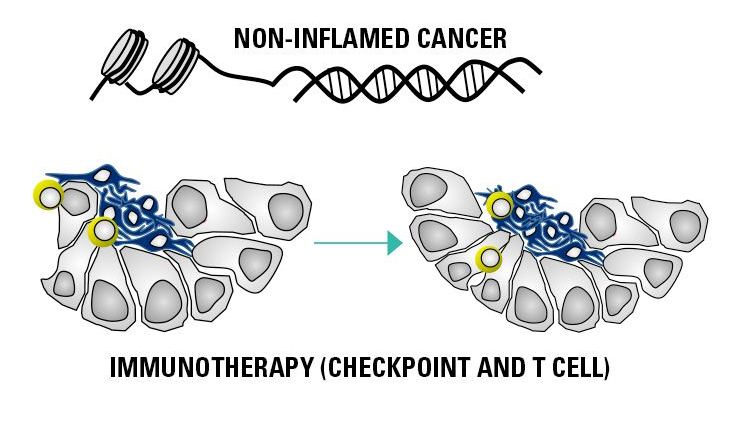Research explains limits of cancer immunotherapy drugs
Media contact: Nicole Fawcett, 734-764-2220 | Patients may contact Cancer AnswerLine, 800-865-1125
Finding offers possibility to improve response to therapies
ANN ARBOR, Mich. — Immunotherapy treatments have proven wildly successful in treating some patients with cancer. But despite this success, the majority of patients do not respond to the treatments.

A new study from the University of Michigan Rogel Cancer Center reveals molecular changes within the tumor that are preventing the immunotherapy drugs from killing off the cancer.
Clinical trials with PD-L1 and PD-1 blockade suggested that tumors with a high number of inflammation-causing T cells were more responsive to the immunotherapy-based PD-L1 and PD-1 inhibitors. Tumors with low inflammation, or low T cells, were less responsive. But what controls T cells in the tumor microenvironment is poorly understood.
“We defined a molecular mechanism to explain why some tumors are inflamed and others are not – and consequently why some patients will be responsive to therapy and others not,” says senior author Weiping Zou, M.D., Ph.D.
“If we can reprogram this epigenetic mechanism, then the therapy might work for more patients,” says Zou, Charles B. de Nancrede Professor of Surgery, Immunology and Biology at the University of Michigan Medical School.
Zou’s group was the first to show PD-L1 expression, regulation and functional blockade in dendritic cells in the human cancer microenvironment.
In this study, published in Nature, researchers studied human and mouse models of ovarian cancer cells. They applied epigenetic drugs and found that the numbers of T cells in the tumor increased. They also saw that the epigenetic drugs synergized the anti-tumor effect of PD-L1 blockade in their models.
“We hope this could be developed into a clinical trial testing a combination of PD-L1 and PD-1 blockade with epigenetic therapy. We want to see if we can make the responders more responsive and turn the non-responders into responders,” Zou says.
Additional authors: From U-M: Dongjun Pen, Ilona Kryczek, Nisha Nagarsheth, Lili Zhao, Shuang Wei, Weimin Wang, Yuqing Sun, Ende Zhao, Linda Vatan, Wojciech Szeliga, Yali Dou, Kathleen Cho, Rebecca Liu; from Medical University in Lublin, Poland: Jan Kotarski, Rafal Tarkowski; from Henry Ford Health System: Sharon Hensley-Alford, Adnan Munkarah
Funding: National Institutes of Health grants CA190176, CA123088, CA099985, CA193136, CA152470, CA171306, 5P30 CA46592; Rivkin Ovarian Cancer Center, Ovarian Cancer Research Fund, Barbara and Don Leclair
Disclosure: None
Reference: Nature, “Epigenetic silencing of Th1 type chemokines shapes tumor immunity and immunotherapy,” doi:10.1038/nature15520, published online Oct. 26, 2015
